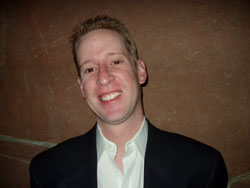REDMOND, Wash. — March 2, 2009 — Some 1,500 Microsoft Most Valuable Professionals (MVPs) have converged on Microsoft’s Redmond, Wash., campus this week for the 2009 MVP Global Summit – four days of networking and discussions with product groups, executives, and Microsoft CEO Steve Ballmer.

Toby Richards, General Manager, Community and Online Support, Microsoft
MVPs constitute a select community of independent technical experts committed to sharing their knowledge with others and the company. Microsoft considers them to be crucial as both the representatives of the customer’s voice and also as the company’s harshest critics. This dual nature helps facilitate in-depth discussions with the product groups about how they can improve current and future versions of the software and provide more value to customers.
To find out more about the impact MVPs have made, PressPass spoke with Microsoft Excel MVP Nate Oliver, Microsoft Visual Studio Team System MVP Ed Blankenship, and Toby Richards, Microsoft general manager of Community and Online Support.
PressPass: Why did Microsoft create the MVP Award Program?
Richards: One of the main reasons we started the MVP Award Program was because the MVPs do such a great job representing the voice of the customer and their best interests. As customers, we all like to hear from others just like us. When it comes to adopting Microsoft technology, MVPs definitely represent the voice of the independent expert.
PressPass: Can you give me an example of the impact MVPs have made?

Nate Oliver, Microsoft Excel MVP
Oliver: I was having a passing conversation about billiards with the vice president of the Women’s Professional Billiards Association (WPBA) board of directors. She noticed the “Microsoft Excel MVP” in my signature and asked for help implementing a new initiative focused on compiling player and tournament-related statistics. I volunteered to train WPBA members, restructure their data, and automate the sorting and distributing of rankings based on individuals’ scorecards from WPBA tournaments.
Not only has this saved the WPBA hours of processing time following each event, but it’s also made it possible to post the statistics on the association’s Web site. They’ve already received numerous e-mails from fans around the world who noticed the stats online and have seen them used in broadcast coverage of billiards tournaments. The WPBA is confident this will improve audience ratings and viewership for WPBA tournament coverage.
Blankenship: I’m the release engineering manager at Infragistics, the world leader in user interface development tools. But as an MVP, I speak at local user groups, conferences and code camps around the United States, sharing my expertise in Microsoft Visual Studio Team System and Team Foundation Server.
In December I participated in a pilot program, during which time I was the “MVP in residence” at Microsoft’s Redmond campus. Basically, I took a week of vacation from my normal job to engage with the product group on a community project. I helped package an internal resource for public use, so Visual Studio Team System professionals around the world can learn from the work of internal teams at Microsoft.

Ed Blankenship, Microsoft Visual Studio Team System MVP
I’m also able to contribute to the Visual Studio Team System products by continually giving feedback to the product group in various ways, including our important face-to-face interactions at the MVP Global Summit. This interchange is critical to ensuring the product is top-notch when it gets released. And the face-to-face interaction at the summit also gives me a chance to feed off the passion of the product group and others in the room who share my excitement for the products.
Richards: These are all great examples of the MVP Award Program’s benefits in many areas. Because of their expertise in specific areas, MVPs are very clear in their feedback and in describing the circumstances surrounding a performance issue, which makes it much easier for product groups to resolve.
But MVPs are also community leaders whose insights represent the voices of many customers. One example that comes to mind is a Windows MVP from Brazil whose webcast on Windows Vista was viewed by 17,000 Brazilians. It’s a good reminder that many of these MVPs have huge followings, and their contributions through broad-reaching outlets and local interactions that include user groups, blogs and the Microsoft community forums benefit everyone involved.
PressPass: As MVPs, what motivates you to volunteer your time and expertise in helping others?
Oliver: Initially, my involvement in communities was simply a desire on my part to give knowledge back to the community. Today, I enjoy teaching others with less experience and collaborating with peers.
Blankenship: I’ve always been an advocate of sharing as much knowledge with other people as possible. Before I was an MVP, I went to user groups and took advantage of other MVPs contributing their knowledge. I really loved what they were doing and felt like it was something I could easily do as I built my expertise. Now it’s just second nature for me to help people and share that expertise.
PressPass: How has social media changed the way customers and MVPs connect?
Blankenship: Frankly, it’s helped make the discovery of people’s problems much easier. Several MVPs, including me, have set up searches that monitor different topics on Twitter that enable us to respond quickly to people needing help. It’s a quick turnaround for everyone and helps us get a better feel for the pulse of the community at the same time.
Oliver: In addition, social media tools such as Twitter and Facebook have definitely expanded the playing field. Historically, some people might not have participated in traditional community forums, or would only have done so in specific forums. But social media tools tend to bring these people from the fringes of the crowd and into the conversation.
Richards: Customers can certainly find MVPs through a personal blog, Twitter or Facebook, but they can also connect with MVPs through the more traditional channels of Microsoft Developer Network (MSDN) and TechNet. And we’re incorporating bookmarking and Del.ici.ous tools into MSDN as well, so customers can easily find out more about an MVP’s particular expertise or interests — such as Windows Vista or billiards — and share that MVP’s expertise with all their friends and associates by marking them as a favorite.
PressPass: What else is in store for the MVP Award Program this year?
Richards: At a community level we’ll be improving our how-to and support content by enabling more annotation and wiki functionality on Microsoft support sites, and providing moderation capabilities to MVPs. Consequently, registered contributors will be able to add context by pointing readers to further information and tagging support articles for relevant technology or software applications. We’re also investing in new tools and community forums that will give consumers easier access to the expertise of MVPs.
Our hope is that by engaging MVPs and creating a more intuitive customer support experience, we can generate even more excitement around the Windows brand and a host of new opportunities, including Azure, virtualization, Office and Exchange Server.




